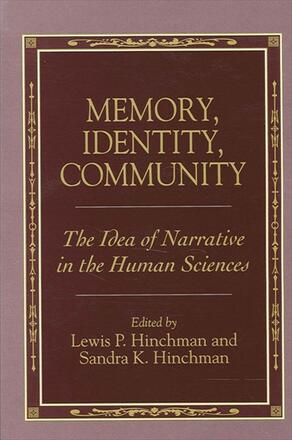
Memory, Identity, Community
The Idea of Narrative in the Human Sciences
Alternative formats available from:
This multidisciplinary volume documents the resurrection of the importance of narrative to the study of individuals and groups and argues that narrative may become a lingua franca of future debates in the human sciences.
Description
This anthology documents the resurrection, in the last few decades, of the importance of narrative to the study of individuals and groups. The editors propose that the human sciences are undergoing a paradigm shift away from nomological models and toward a more humanistic language in which narrative plays a complex and controversial role. Narratives, they claim, help to make experience intelligible, to crystallize personal identity, and to constitute and nurture community.
The fifteen articles in this collection, organized into sections dealing with memory, identity, and community, are by noted scholars representing a wide variety of disciplines, including philosophy, history, religion, communication, environmental studies, political science, sociology, anthropology, psychology, and law. They advocate diverse political and ideological positions, supporting the editors' belief that because narrative has not been captured by any academic bloc, it has the potential to become a lingua franca of future debates in the human sciences.
Lewis P. Hinchman is Professor of Government, Center for Liberal Studies, at Clarkson University. His previous books include Hegel's Critique of the Enlightenment. Sandra K. Hinchman is Professor of Government at St. Lawrence University. Her previous work includes Hiking the Southwest Canyon Country. The two are coeditors of Hannah Arendt: Critical Essays, also published by SUNY Press.
Reviews
"The topic of narrative is as significant as the editors claim in their Introduction. It is becoming central to various social science fields, particularly for scholars who want to challenge traditional realist and positivist paradigms. The editors have made provocative selections, including many articles that are frequently cited in these debates. The book will be tremendously valuable to those who want to find their bearings in the vast writings on this topic. " — Lisa Disch, University of Minnesota
"I like the interdisciplinary character of this volume. The editors are right that one can only get a good grip on the importance of narratives if one sees their relevance to a wide range of intellectual pursuits. " — Bernard P. Dauenhauer, University of Georgia
"By reading about narrative from a wide range of different contexts, the reader is bound to make some surprising discoveries. The broad range of topics covered makes it obvious that the importance of narrative has made itself felt in any number of disciplines. " — Donald P. Spence, author of Narrative Truth and Historical Truth: Meaning and Interpretation in Psychoanalysis